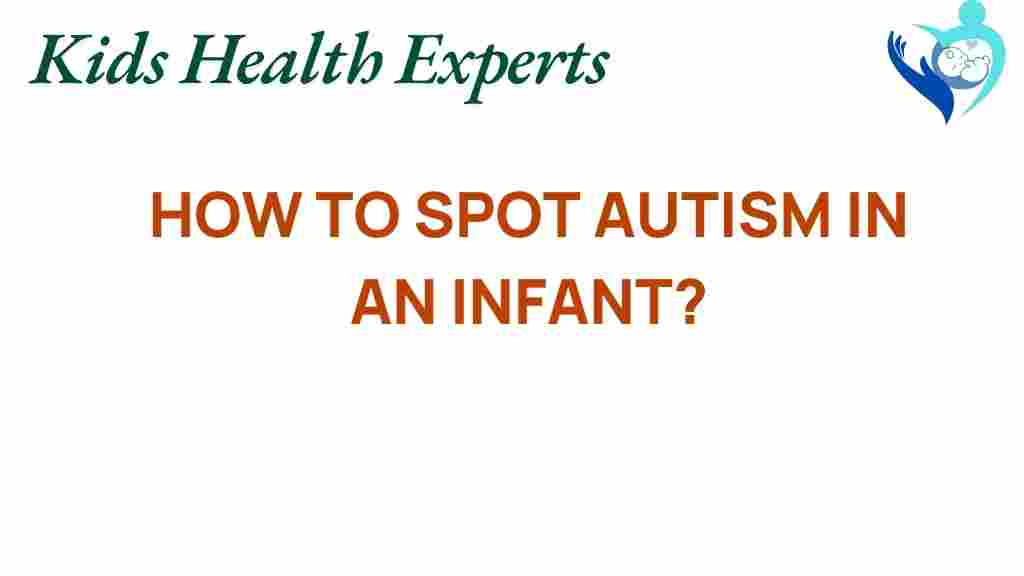Unraveling Autism: Early Signs to Watch for in Infants
Autism spectrum disorder (ASD) is a complex neurodevelopmental disorder that affects communication, behavior, and social interaction. Understanding the early signs of autism can be crucial for parents as it allows for timely intervention and support. With a growing prevalence of autism diagnoses, parental awareness is essential in recognizing the early signs of autism in infant development. This article aims to provide a comprehensive overview of the early signs of autism, the importance of monitoring developmental milestones, and the available diagnostic tools.
Understanding Autism and Neurodevelopmental Disorders
Autism is classified as a neurodevelopmental disorder that typically appears in the first three years of life. The symptoms and severity of autism can vary widely among individuals. Early diagnosis and intervention can significantly improve outcomes for children with autism, which is why it is crucial for parents and caregivers to be aware of the early signs and behaviors associated with the disorder.
Recognizing the Early Signs of Autism
Identifying autism in infants can be challenging, as many of the behaviors may overlap with typical infant development. However, certain early signs can indicate potential concerns. Here are some key early signs to watch for:
- Social Engagement: Limited eye contact, lack of response to their name, or diminished interest in social interactions can be early signs.
- Communication Skills: Absence of babbling or cooing by 6 months, failure to make gestures such as pointing or waving, and not using single words by 12 months.
- Repetitive Behaviors: Engaging in repetitive movements or activities, such as hand-flapping or rocking, can be indicative of autism.
- Joint Attention: Difficulty in sharing attention with others, such as pointing to objects or looking back and forth between an object and a caregiver.
- Play Skills: Lack of interest in pretend play or limited engagement with toys can be a sign of developmental delay.
The Importance of Monitoring Developmental Milestones
Developmental milestones are key indicators of a child’s growth and development across various domains: physical, cognitive, social, and emotional. Each child develops at their own pace, but there are general guidelines that can help parents identify potential concerns:
- By 2 months: Infants should respond to sounds, smile at people, and follow moving things with their eyes.
- By 6 months: They should make sounds like “ah” and “eh,” show interest in faces, and start to babble.
- By 12 months: Infants should say “mama” or “dada,” engage in simple gestures like waving goodbye, and look for things they see you hide.
- By 18 months: Children should be able to point to things they want and understand simple commands.
- By 24 months: They should use at least 50 words and begin to combine words into simple sentences.
Parental Awareness and Advocacy
Parental awareness is crucial in the early identification of autism. Parents should trust their instincts and seek guidance if they notice concerning behaviors in their infants. Early intervention programs can provide support and resources that are vital for promoting healthy development.
It’s important for parents to engage with healthcare providers during regular check-ups. Discuss any developmental concerns openly, and don’t hesitate to ask for screenings or assessments. Being proactive can lead to earlier diagnosis and better outcomes.
Diagnostic Tools for Autism
When parents suspect autism, healthcare providers often use a variety of diagnostic tools to assess the child’s development. These may include:
- Developmental Screening: Standardized questionnaires that help identify children who may be at risk for developmental delays.
- Comprehensive Evaluation: A thorough assessment by a team of specialists, including psychologists, speech therapists, and pediatricians.
- Observation: Direct observation of the child’s behavior in different settings can provide insight into their social and communication skills.
Step-by-Step Process for Monitoring Your Infant’s Development
1. **Observe Regularly:** Keep a log of your child’s behavior, noting any unusual patterns or delays in reaching developmental milestones.
2. **Engage in Play:** Regularly play with your infant to encourage interaction. Pay attention to how they respond to your cues and their interest in activities.
3. **Communicate:** Talk to your child frequently, using clear language and expressions to foster communication skills. Encourage them to mimic sounds and gestures.
4. **Attend Regular Check-ups:** Make sure to schedule and attend well-child visits with your pediatrician to discuss developmental progress and concerns.
5. **Educate Yourself:** Research autism and other neurodevelopmental disorders to better understand what signs to look for and how to support your child.
Troubleshooting Tips for Concerned Parents
If you are concerned about your child’s development, consider the following troubleshooting tips:
- Document Concerns: Keep a detailed record of your child’s behaviors that worry you, including dates and specific examples.
- Seek Professional Help: Don’t hesitate to contact a pediatrician or child psychologist for an evaluation.
- Join Support Groups: Connecting with other parents can provide valuable insights and emotional support.
- Utilize Resources: Many organizations offer resources and support for families with children on the autism spectrum. Check out the Autism Society for more information.
Conclusion
Recognizing the early signs of autism in infants is crucial for timely intervention and support. By monitoring developmental milestones and staying vigilant about changes in child behavior, parents can play an essential role in their child’s early development. Parental awareness and advocacy are vital components in navigating the complexities of neurodevelopmental disorders like autism.
While every child develops at their own pace, being informed and proactive can lead to better outcomes. If you have concerns about your child’s development, reach out to healthcare professionals and utilize available resources. Early identification and intervention can significantly impact your child’s future, paving the way for a brighter, more fulfilling life.
For more information on developmental milestones and autism, visit CDC’s Autism Information.
This article is in the category Conditions and created by KidsHealthExperts Team
